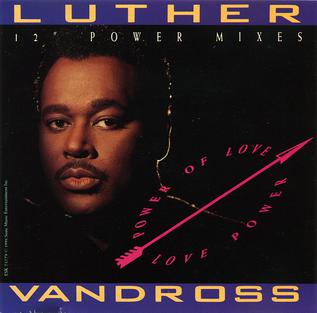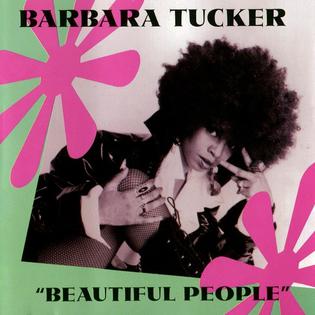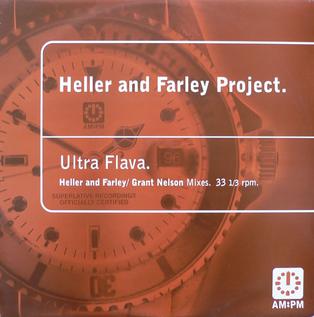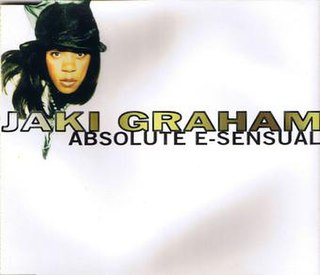Qkumba Zoo is a South African dance music duo from Johannesburg, South Africa, consisting of vocalist Levannah and musician/producer Owl. The band was originally formed by Owl and Levannah as a duo called Ocean Road.

"Losin' Myself" is a song by American singer-songwriter-actress Debbie Gibson, released in January 1993 as the first single from her fourth album, Body, Mind, Soul (1993). The song was written by Gibson, and co-written and co-produced with Carl Sturken and Evan Rogers. "Little" Louie Vega and Kenny "Dope" Gonzales for Masters at Work Productions remixed it for the single and maxi single releases. Stalling at No. 46 on the US Billboard Hot Maxi Singles chart, No. 49 on the Hot Contemporary chart, and No. 86 on the Hot 100, this song marks Gibson's last appearance on the Hot 100 to date.

"A Song for Mama" is a number-one R&B single by the American R&B group Boyz II Men. The tune, which was written and produced by Babyface, served as the theme song to the 1997 motion picture Soul Food, and spent two weeks at number one on the US R&B chart. To date, it is their 11th and last top 10 hit, peaking at number seven on the Billboard Hot 100. The song also appears on the group's fourth album, Evolution (1997).

"Power of Love/Love Power" is a single by American singer-songwriter Luther Vandross. It was released on April 9, 1991 as the lead single from his 1991 album of the same name. The song spent two weeks at number one on the US R&B chart, and peaked at number four on the US pop chart, becoming his biggest pop solo hit.

"You Don't Know" is a song by American singer-songwriter Cyndi Lauper, released by Epic as the first single from Lauper's fifth album, Sisters of Avalon (1997). Remixes of the song were made by several producers such as Tony Moran and Junior Vasquez. It peaked at number 27 in the UK, while peaking at number 16 on the US Billboard Hot Dance Club Play chart. The song contains the word "bullshit" and was not edited out of the UK singles as is typical. While performing on several UK shows, such as Noel's House Party, she skipped the word. The music video for the song was directed by Lauper.

"Ballad of Cleo and Joe" is a song by American singer-songwriter Cyndi Lauper, released as the third single from her fifth studio album, Sisters of Avalon (1996). The song was written by Lauper and Jan Pulsford, and produced by Pulsford, Mark Saunders and Lauper. It was released on September 16, 1997, by Epic Records. Lyrically, the song describes the double life of a drag queen, the titular 'Joe' and 'Cleo'. It received positive reviews from music critics. The song did not enter the US Billboard Hot 100, but debuted at number 24 on the Billboard Bubbling Under Hot 100 Singles chart.

"Spin That Wheel" is a song by Hi Tek 3 in collaboration with Belgian group Technotronic members Ya Kid K and Jo Bogaert. It was released under the name "Hi Tek 3 featuring Ya Kid K" in 1990. Hi Tek 3 are listed as Kovali, El Sati and Yosef.

"Invisible Man" is the debut single by American boy band 98 Degrees, released on June 24, 1997 as the first single from their debut album 98 Degrees (1997). It was their breakthrough hit, peaking at number 12 on the US Billboard Hot 100. The song is featured as a bonus track on the European version of 98 Degrees and Rising. An acoustic version of the song is the closing track on their 2013 studio album 2.0.
"Keep On Jumpin'" is a song written by musician Patrick Adams and Ken Morris. This track has been remade, remixed, and sampled numerous times, but only the 1978 original by Adams's group Musique and Todd Terry's 1996 updated version with Martha Wash & Jocelyn Brown reached number one on Billboard's Hot Dance Club Play charts. Musicians on the tracks include Rich Tannenbaum on drums, Ken Mazur on guitar, and Norbert Sloley on bass. Listed here are the most notable versions.

"Carry On" is a song by American singer Martha Wash, released on October 30, 1992 through RCA Records as the lead single from her debut solo self-titled studio album, Martha Wash (1993). It was written by Eric Beall, who also composed the instrumentation in collaboration with Steve Skinner and peaked at number-one on the US Billboard Hot Dance Club Play chart.

"Give It to You" is a song recorded by American singer-songwriter Martha Wash and the second release from her self-titled debut album, Martha Wash (1992). The song is the follow-up single to "Carry On", and is written and produced by Brian Alexander Morgan. Released in January 1993 by RCA Records, it would be her second number-one single on the US Billboard Dance Club Songs chart, reaching the top spot on April 3, 1993. It also became a modest crossover hit on the Billboard Hot 100 and Cash Box Top 100, peaking at numbers 90 and 91, same year. The music video for "Give It to You" was directed by German director Marcus Nispel, featuring Wash performing in a castle, surrounded by shirtless male dancers.

"Beautiful People" is a song recorded by American singer-songwriter Barbara Tucker, who co-wrote it with India, Lem Springsteen and "Little" Louie Vega, who along with partner Kenny "Dope" Gonzalez, co-produced the track. It was released on March 2, 1994, as her first single by Strictly Rhythm Records, and was also Tucker's first of seven number-one singles on the US Billboard Hot Dance Club Play chart, reaching the top spot on April 16, 1994. On the UK Singles Chart, it peaked at number 23, while it topped both the UK Dance Singles Chart and the UK Club Chart.

"Ultra Flava" is a house song by British duo Heller and Farley Project. After the wide renown with their remix of Ultra Naté's "How Long" in 1994 and M People's "Open Your Heart" in 1995, they released it as a single in 1996. It is a slightly re-worked version of their mix of "How Long", without Naté's vocals. They entitled it "Ultra Flava" as a nod to the track's origins. It was a huge club hit and peaked at number 22 on the UK Singles Chart, while reaching number-one on the UK Dance Singles Chart. In the US, it peaked at number three on the Billboard Hot Dance Music/Club Play chart. A black-and-white music video was also produced to promote the single.

"Never Alone" is a song by Dutch Eurodance group 2 Brothers on the 4th Floor. It was released in November 1993 as the third single from their debut album, Dreams (1994). Produced by brothers Martin and Bobby Boer, the song was their first single featuring rapper D-Rock and singer Des'Ray. It was a number-one hit in Brazil, Israel and South Africa. In the group's native Netherlands, the single peaked at number two. In 2014, new remixes of the song by JoeySuki and Jonathan Pitch were released. Its music video sees the duo performing on a beach in Mexico.

"The Child (Inside)" is a song by South African trio Qkumba Zoo, released in August 1995 as their first single from the international debut album, Wake Up and Dream (1996). The song shot straight to the top of the charts in South Africa, earning them the Best New Band award at the 1996 South African Music Awards. Same year, it was a hit in the US, reaching number 69 on the Billboard Hot 100 as well as peaking at number-one on the Billboard Hot Dance Club Songs chart. The trio was the first South African group to top the Hot 100 in over 17 years. The track also peaked at number 34 on the Radio & Records contemporary hit radio chart on October 18, 1996. A music video was also produced to promote the single.

"Gotta Let You Go" is a song by American freestyle and house music singer Dominica. Written by Mohamed Moretta and produced by him with Mickey Garcia, it was released in 1994 by Ouland Music and became a hit in clubs. The song was also a top 40 hit in the Netherlands (34) and a top 90 hit in Germany (81). Several music videos has been produced for "Gotta Let You Go". In 2015, Northern Irish electronic music duo Bicep released a remix of the track.

"Absolute E-Sensual" is a song by British singer-songwriter Jaki Graham, released on 26 June 1995 by Avex UK and Critique as the third and final single from the singer's fourth album, Real Life (1994). The song was a club hit, peaking at number three on the US Billboard Hot Dance Club Songs chart, with 13 weeks within the chart. Additionally, it charted in Australia and the UK, peaking at number 54 and 69, respectively. But it was a bigger hit on the UK Dance Chart, reaching number 31, while peaking at number 15 on the UK on a Pop Tip Club Chart. The song was also Graham's final charting single.

"Stranded" is a song by American singer Lutricia McNeal, released as the third single from her debut album, My Side of Town (1997), in May 1998. The song was a top 10 in Austria, Hungary, Ireland, Norway, Sweden, and the United Kingdom. In the latter, it reached number three on both the UK Singles Chart and the UK R&B Chart. On the Eurochart Hot 100, it peaked at number 10 in June 1998. Outside Europe, the single was a top-three hit in New Zealand and also peaked at number six on the US Billboard Hot Dance Club Play chart. In 1999, it was reported that "Stranded" had sold 2 million copies.

"Don't Go Away" is a song by German Eurodance band Fun Factory, released in April 1996 by various labels as the fourth single from the band's second album, Fun-Tastic (1995). The song is written by Bülent Aris, Toni Cottura and Rodney Hardison, and was a success especially in Spain, peaking at number six. Additionally, it was a top 40 hit in Austria (31) and Germany (37). Outside Europe, "Don't Go Away" reached number 93 on the Billboard Hot 100 chart in the US. Its accompanying music video was directed by V. Hannwacker & M. Rosenmüller, featuring the band performing at a party on the beach.

"I Want You" is a song by English singer-songwriter Juliet Roberts, released in March 1994 by Cooltempo as the second single from the singer's debut album, Natural Thing (1994). Originally released as a double A-side with her song "Again", it was then released as its own single following the success of its predecessor, "Caught in the Middle", in 1994. Co-written by Roberts with Nathaniel Pierre Jones, it was produced by Dancin' Danny D and peaked at number one on the US Billboard Hot Dance Club Play chart. The song also reached number 44 on the Billboard Hot 100. In Europe, it charted in the UK, where it peaked at number 28 on the UK Singles Chart, but was more successful on the UK Dance Singles Chart, reaching number three in October 1994. The accompanying music video for the song was directed by American filmmaker and comic artist Antoine Fuqua.

















